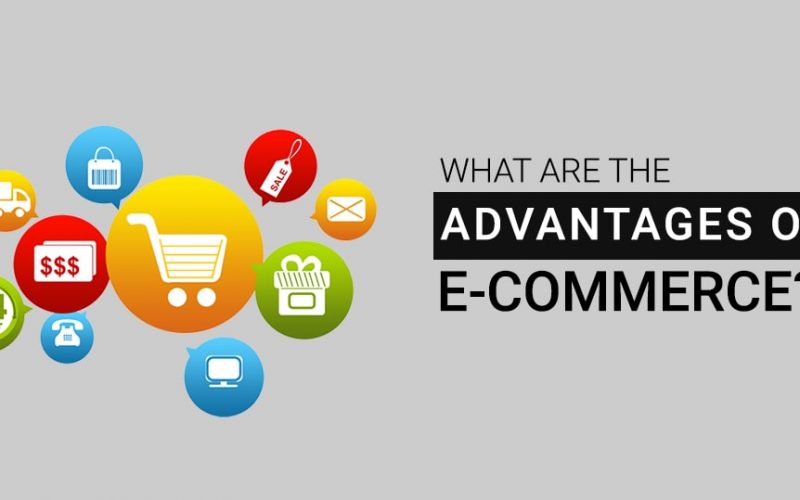In the last few years, the growth of e-Commerce has been somewhat exponential; especially with the invasion of the Covid-19 pandemic. According to statistics, over 2 billion people ordered products and services online in 2020, with global e-Commerce sales exceeding 4.2 trillion dollars. In fact, e-Commerce is growing at such a rapid pace that it is predicted to service over 2.14 billion people by 2023. So the question of whether or not venturing into the e-commerce business would be profitable shouldn’t be up for debate. Like every business out there, e-Commerce has its advantages and drawbacks. The real questions should be, “Do these advantages outweigh its disadvantages; or rather Am I willing to take calculated business risks, leveraging on the advantages while setting frameworks in place to mitigate those risks?”
Either way, you’d need every information at your disposal to make these decisions. In light of these, we’ll go over both advantages and drawbacks of the e-commerce business.
What Are the Advantages of E-commerce?
The cheap financial cost of e-Commerce is at the top of the list, even though other benefits include selling abroad, retargeting customers, personalizing the purchase experience, and so on. The e-commerce advantages below will help you decide whether or not opening an online store is the best option for you.
#1. Low Financial Cost
Unlike physical stores, online stores are more cost-effective. To rent a physical retail store, business owners have to pay heavily. They also have a number of up-front expenses, such as retail signage, store design, inventory purchases, sales equipment, and so on. Not to mention the fact that the store owner must hire employees to work and run each site. Depending on the store’s merchandise worth, they may additionally need to recruit security personnel.
Startup costs for an e-Commerce dropshipping business, on the other hand, are within the range of $450-$550; that’s regardless of whether you decide to build it on WordPress or rent space on Shopify.
Read Also: Start An E-commerce Business & Make Money From Home & Anywhere! Discover The Secrets.
However, depending on the type of e-Commerce business you have in mind, you may only need to hire people if you have reached a particular level of success. And because your online store is online, these employees can work from anywhere, making it easier to discover employees who are a good fit for your business. You won’t need to acquire bulk inventory if you dropship online, which will save you a lot of money.
With e-Commerce, branding is also less expensive. A store logo is usually less expensive than a store sign. Graphic designers (even the best ones) are frequently less expensive than an offline paint job. One of the most appealing perks for new entrepreneurs is that their business expenses are often substantially lower.
#2. Potential Income 24 hours a day, 7 days a week
The fact that online retailers are constantly available for business is another advantage of the e-Commerce business. You can basically reach any segment of your target audience at any time of the day (including odd hours) in any part of the world using Facebook ads. Most physical locations, on the other hand, are open from 9 a.m. to 9 p.m., giving you a competitive advantage. In other words, you can attract consumers who would ordinarily pick up a product in a store if the outlet were open by being available at all hours.
With an e-Commerce business, you can reach also out to those with irregular work schedules or who don’t have time to purchase in person.
Furthermore, think about clients who place their orders late at night. To meet their needs, you don’t need staff working the night shift. To provide your consumers peace of mind, automate your ordering systems so that they receive a confirmation email when they place an order.
An added advantage when it comes to opening an online store over a physical store is that you will never need to hire a security guard!
#3. Luxury of Selling Internationally
Next on the list of e-Commerce advantages is the ease with which a new brand can sell to customers in any part of the world. You might find your target audience in the United Kingdom, South America, or neighboring countries. If you opt to dropship from AliExpress, several products have low-cost or no-cost ePacket shipping. This enables you to sell and send your products to a global audience at a competitive price.
Selling internationally is a fantastic aspect of the e-Commerce business since it allows you to establish your brand faster, expand your market considerably, and profit far ahead of your local competitors.
#4. Simplified Display of Bestsellers
Displaying best-sellers and other e-Commerce features makes it easier to show off products to your customers. While you can design a brick-and-mortar store to persuade customers to buy certain things, it’s faster for a customer to find the best-sellers in an online store than it is to travel through multiple aisles and shelves.
The upside to this is that customers would more willing to buy your best-sellers since they already have a good track record. Basically, others have already purchased these and are pleased with their purchase. So, you can incorporate new products in your upsell, email marketing, or retargeting advertisements to show them to customers.
Read Also: FREE EMAIL MARKETING TOOLS: Best 11+ Tools 2023, Updated!!!
#5. Personalized Online Experience
One of the most significant advantages of running an online retail store is the ability to develop customized landing pages for various audiences. This persuades them to buy from you without requiring much additional effort on your part. It’s totally different from customers who walk into a physical store and need to be nurtured right away. In this case, you put in all of the efforts before launching a campaign, for example, and then sit back as soon as you commence marketing to your target base.
You can also personalize your email marketing campaigns to provide a more personalized experience. Consider segmenting your email lists depending on customer purchases, region, or even the amount of money they spend.
Read Also: EMAIL MARKETING LIST: Is buying a better choice?
Another approach is to retarget customers who have visited your online store by showing them an advertisement for a product they added to their cart but then forgot to purchase.
You can also design a welcome message to appear if your online business has a login feature, such as ‘Welcome back (name).’
Meanwhile, Product bundles allow customers to buy more at a lower price, resulting in a higher average order value. Upsells can also be customized based on what the consumer has looked at or what you believe they might enjoy based on their purchase history.
#6. Reasonable Cost of Keeping Employees
The low cost of hiring keeping staff is one of the perks of this kind of business. And, as previously stated, you may hire from anywhere in the world. You have the option of outsourcing work to virtual assistants in countries with cheaper maintenance costs.
In contrast to a physical store, an online business will require less personnel. Plus, you don’t even have to hire them right away. You can build and operate on your own until you’ve reached a certain level of success or have sufficient funds.
On the other hand, the decision is yours to make. But in any case, there’s no scenario where you would as much workforce as a physical store demands.
#7. Easier to Inspire Impulsive Purchases
Another advantage of e-Commerce is that you can profit from impulse purchases because online shoppers are more likely to do so. You can design commercials that promote impulse purchases if you have appealing product pictures with brilliant colors or human emotion.
To entice consumers to buy, you might also use scarcity strategies such as countdown timers or displaying limited amounts.
Furthermore, if you have a new or limited-edition product in your inventory, you can try it out for impulse purchases to see how consumers react. Impulse buyers are more social and image-conscious, so they may buy to brag about having gotten the latest goods before anybody else.
#8. Easier to Retarget or Remarket to Customers
When running an online store, it’s less complicated to generate retargeting advertisements to reach out to local clients. This makes it one of the most profitable e-Commerce advantages. For starters, you can use a Facebook Pixel to show adverts to potential consumers in their news feeds on Facebook.
Simply put, people who add things to their cart but abandon them and do not buy, or those who browse a blog article but do not buy, can be retargeted. You can simply capture email addresses and market to your customers even after they leave your site with an efficient pop-up or lead magnet.
#9. Less Invasive Experience for Customers
Oftentimes people avoid going into a physical store because they have to deal with the workers. Certain customers may prefer online shopping because it is less intrusive, making it one of the best advantages of e-Commerce. It’s a pretty straightforward process.
For example, if customers need questions answered, they can contact the store owner by using the live chat tool, sending an email, or sending a Facebook message. In turn, the store owner can teach the customer care employees to successfully answer questions. When employees are unavailable, a Facebook chatbot can direct users to FAQs and other self-help tools.
#10. Obtain Customer Data with Ease
One of the most appealing aspects of e-Commerce is the ease with which you may obtain data for customer analysis. Most individuals are hesitant to provide physical shops their email addresses or postal codes.
On the other hand, you can obtain your customer’s name, mailing address, email address, and phone number through an e-Commerce store. In literal terms, this means you have at least three options for communicating with them and developing a relationship with them.
You can also ask them to participate in marketing surveys, discuss their birthdays, and more. You can get even more information on them if you ask them to register an account. Meanwhile, if your customers are located in Europe, be sure to follow GDPR guidelines while communicating with them.
#11. Ability to Process a Large Number of Orders
You can easily process a large number of orders if you opt to dropship. As your company grows, you may decide to hire workers to assist with order processing. But then, the dropshipping model eliminates the necessity to physically possess the product in order to sell it to a consumer. As a result, unlike physical retailers, you won’t have to worry about supply control.
Furthermore, long lines at stores can prevent consumers from shopping. There is no waiting period with online retail stores. Customers can place orders on their own time, which allows you to accept a large volume of orders.
#12. Ability to Scale a Business Quickly
Another one of the advantages of e-Commerce is the ease with which it can be scaled. As people click and buy, you can boost your ad spend without having to worry about keeping up with demand, especially if you dropship.
Furthermore, due to limited space, it can be difficult to expand product lines or add more cashiers in brick and mortar stores. To scale your business, you’ll need to find a larger place, renovate, or wait for your lease to expire. If you create informational products, you’ll have a similar problem, as writing ebooks, courses, and other materials take time.
O the other hand, you may add new products to your site without having to worry about shipping or inventory using the dropshipping e-Commerce strategy, allowing you to expand swiftly.
Read Also: How To Calculate Average Inventory- A Complete Step-by-Step Guide
# 13. Use Content to Grow Your Business Organically
With e-Commerce blogging, you can increase organic traffic and sales. You’ll be able to optimize your store to boost traffic and sales without having to spend additional money on anything from generating videos to writing blog content. Furthermore, you will be able to not only generate organic traffic through content development but also monetize those clients with retargeting ads.
This is more cost-effective than the brick-and-mortar alternative which would need to market to its customers or make sure they’re in a high-traffic location.
What Are Ecommerce’s Disadvantages?
There is a disadvantage to every advantage. As a result, it’s critical to be realistic while launching an online store. Below are a few common eCommerce challenges.
#1. During a Site Crash, No One Can Buy
The worst e-Commerce disadvantage is when your site crashes and no one can buy from you. As a result, it’s crucial to ensure your website is hosted on the appropriate platform. If you go for the lowest-charged hosting option, your site will most certainly crash if you get a rush in traffic from a high-converting ad or a Shark Tank shout-out. So your best bet is to look out for options that would give you more space and security.
Fortunately, there are tons of them out there. You can make your pick from platforms like Hostinger, Bluehost, and the rest of them. Or better still go for platforms with ready-to-go e-commerce web templates like Shopify.
#2. Customers Can’t Try Before Purchasing
While this is a prevalent setback for online several retailers, it will not be a long-term issue. Quite a number of them now use augmented reality features in their stores to allow shoppers to try on things; not literally tough.
How does augmented reality work? As an example, have a look at Sephora’s Virtual Artist app. Customers can visually test on different eyeshadows, lip colors, and more at the cosmetic retailer’s augmented reality experience.
#3. It is Extremely Competitive
Another of the major e-Commerce drawbacks is battling for clients. The truth is that the most profitable niches are frequently the most competitive. That is why they attract so many entrepreneurs. The more competitive a niche is, however, the more expensive its ads are. There are a few ways to get around this. To begin with, you can implement a marketing plan that is distinct from that of your competitors.
Read Also: Most Profitable Niches For Your New Online Business
If competitors are targeting all of your customers through Facebook advertisements, you might want to attempt ranking organically with SEO optimization. If all of your competitors are using Pinterest, you may want to consider Instagram marketing if your target demographic is very visual.
Secondly, if your advertising is pricey, you can direct traffic to blog posts and then retarget your consumers who view them to create cheaper ads.
#4. Customers Can Be Impatient
If a consumer has an inquiry at the store, a salesman is on hand to help. However, one downside of e-Commerce is that most businesses take forever to reply to clients’ inquiries. The reality is that most clients anticipate responses from a business on social media within an hour. They may become upset and shop somewhere else if you take too long to respond. You must be available 24 hours a day, seven days a week.
A simple fix is hiring a hands-on customer care representative. Upwork allows you to hire customer care agents that have been trained to make your clients happy. Alternatively, you can use a chatbot to assist clients in finding answers at any time of day or night. But none of this equates to a person who can care for each consumer on a one-on-one basis.
#5. Shipping Durations Could Take a Long Time
One other prevalent ecommerce disadvantage, according to reviews, is shipment timeframes. When a customer purchases a product in person, she can take it home right away. Customers who shop online, on the other hand, typically receive their items in a week or more.
Despite the fact that Amazon offered same-day shipping, it was not a profitable business until Amazon Prime was founded. Because they have tens of millions of Prime subscribers, it has only recently become profitable. However, Transparency with your consumer is the solution. When customers place an order, let them know when they can receive their goods.
#6. Physical Retail Is Still More Popular Despite
Regardless of the rapid growth in e-Commerce, physical retail still controls the majority of the industry. The retail industry had accumulated a total of $4.184 trillion notwithstanding the havoc wrecked on offline retailers due to the COVID-19 epidemic.
Starting an online retail business in its early phases helps you to establish yourself as a market leader. However, if you own a physical store, you should think about expanding your online presence, and vice versa. Despite being the largest online retailer, Amazon is now opening physical locations. Retailers such as Gap and Macy’s are also rushing to go online. Currently, there is a lot of potentials for e-Commerce businesses to leverage on.
What Are the 10 Advantages of E-commerce?
Some of the advantages of e-Commerce include the following;
- Low Financial Cost
- Potential Income (24 hours a day, 7 days a week)
- Luxury of Selling Internationally
- Simplified Display of Bestsellers
- Personalized Online Experience
- Reasonable Cost of Keeping Employees
- Easier to Inspire Impulsive Purchase…
What Are the Advantages of E-commerce Short Answer?
The cheap financial cost of e-Commerce is at the top of the list, even though other benefits include selling abroad, retargeting customers, personalizing the purchase experience, and so on.
What Is the Biggest Advantage of E-commerce?
The low financial cost of ecommerce is at the top of the list of advantages, but other benefits include selling abroad, retargeting customers, customisation of the purchasing experience, and so on. These ecommerce advantages can help you decide whether opening an online store is good for you.
What Is the Importance of E-commerce in Today’s Life?
- Less time spent buying and more time spent using.
- Offers and shopping deals that are exciting to hear about.
- Business system that is transparent.
- The business grows more quickly.
Related Articles
- Electronic Commerce (e-commerce): Definition, Websites, Advantages, and Disadvantages
- CONSUMER FINANCING: Best Financing Companies & Programs
- Start An E-commerce Business & Make Money From Home & Anywhere! Discover The Secrets.
- How Does ELECTRONIC RETAILING Works: E-tailing vs E-Commerce
- Business-to-Business (B2B): How Does It work?






